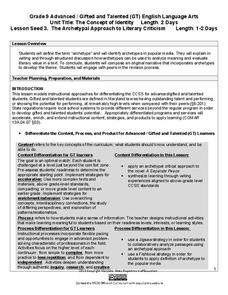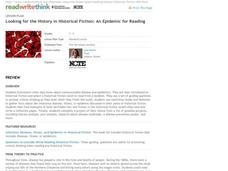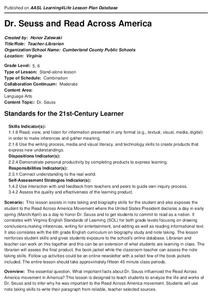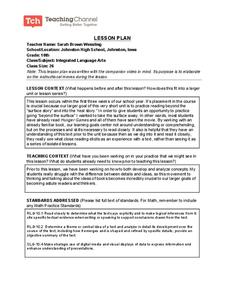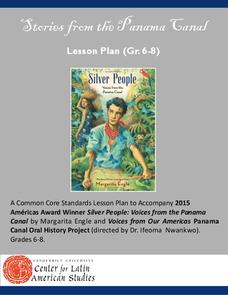Maryland Department of Education
The Concept of Identity Lesson 3: The Archetypal Approach to Literary Criticism
As class members continue their study of approaches to literary criticism, readers examine the symbolism and archetypal patterns in John Knowles' A Separate Peace, and how these parallels are used to develop a theme in the story.
Maryland Department of Education
The Concept of Identity Lesson 4: The Psychological Approach
Readers apply Sigmund Freud's theories of the unconscious mind and the psychological approach to literary criticism to analyze and evaluate the relationship between two characters in A Separate Peace.
ReadWriteThink
Looking for the History in Historical Fiction: An Epidemic for Reading
Combine informational reading skills with fictional text in an innovative historical fiction lessons. After reading a fictional text related to diseases, class members read non-fictional text to gain knowledge about specific infectious...
Curated OER
Learning Life Lessons through Fables
Explore a variety of fables to learn life's lessons through engaging stories. Add rigor to the learning process with activities that include matching a a fable to the story's moral, short answer exit slips, and a three-column graphic...
Maryland Department of Education
The Concept of Diversity in World Literature Lesson 12: Author's Purpose - Yeats and Achebe
Is there such a thing as fate/luck? Can one fight destiny? As part of their study of Chinua Achebe's purpose in writing Things Fall Apart, class members answer these questions from Achebe's point of view and then from William Butler...
The New York Times
Dark Materials: Reflecting on Dystopian Themes in Young Adult Literature
The Hunger Games. Maximum Ride. Why is so much of young adult literature so dark? What is the appeal of dystopian literature to young readers? The six activities in this resource ask kids to reflect on some of the reasons this genre has...
Curated OER
Our “Civilized” Society
The Scarlet Letter is the anchor text in a four-week unit that examines Hawthorne's novel through the lens of the intolerances found in a supposed civilized society. In addition to their reading, class members watch clips from TV shows,...
Boys Town
Teaching Social Skills, Creating Successful Students “Following Instructions” and “Listening”
With the help from learning games and holiday-themed coloring pages, scholars learn the importance of listening carefully and following directions. Coloring pages celebrate Halloween and Thanksgiving. Learning games include Simon...
Curated OER
Dr. Seuss and Read Across America
What important facts about Dr. Seuss influenced the Read Across America movement...? This is the driving question of a research project that requires scholars to find information about Dr. Seuss' life and work. Class members write a...
Teach with Movies
Teaching Students to Write a Narrative
Encourage narrative writing with a clever exercise. Class members watch episodes from movies and describe what happened to a character, including details about the setting, plot, and characters. Writers then craft a narrative about a...
Teaching Channel
Storyboard Lesson Plan
Good books are accessible through a variety of literary lenses. To consider how the same story can be seen in different lights, groups develop a storyboard for a movie teaser that would focus on one of six concepts found in Suzanne...
Vanderbilt University
Stories from the Panama Canal
The stories of the Silver People, the West Indies immigrants hired to work on the Panama Canal, come to life in a lesson about the building of the Panama Canal. Groups research why the canal was built, how it was build, the working...
The New York Times
Literary Pilgrimages: Exploring the Role of Place in Writers’ Lives and Work
Do the places you have lived influence what you write? Class members research the lives of writers and look for how places these writers have lived might have influenced their writings.
New York City Department of Education
Grade 3 Literacy: Investigating Sharks
Shark! Scholars read about sharks in Facts about Sharks by Susanna Batchelor. They then pretend they are shark scientists and choose a shark they want to study. Learners research their sharks and record information in graphic organizers...
Have Fun Teaching
Making Inferences (1)
Provide readers with an opportunity to practice drawing inferences by giving them this worksheet. Kids identify the text and author, record a sentence they believe infers rather than directly says, and then write the deeper meaning the...
Have Fun Teaching
Inferences (2)
Encourage young readers to use their prior knowledge, as well as text clues, to draw inferences from text. Provide them with this worksheet that asks them to record a passage, the background information they already have, the text clues...
Ontario
Reading Graphic Text
Do learners really need to be taught how to read cartoons, comic books, and comic strips? Yes. Just as they need to learn how to read other forms of graphic text such as diagrams, photos, timetables, maps, charts, and tables. Young...
K20 LEARN
Making Sense of MLA: Citing Sources and MLA Formatting
The Modern Language Association (MLA) Style Sheet is about giving credit where credit is due. And while there are different style sheets, the one most often used in Language Arts is the MLA. In this lesson, high school scholars learn how...
Illustrative Mathematics
The Napping House
How many people and animals can cram into a single bed? Find out with this cross-curricular math and language arts lesson. Following along with a reading of the children's book The Napping House by Audrey Wood, young mathematicians add...
Busy Teacher’s Café
"Smart" by Shel Silverstein
Find out just how smart your young mathematicians are with this cross-curricular math and language arts lesson. After first reading Shel Silverstein's poem "Smart", students draw pictures of coins to model the different exchanges...
Federal Reserve Bank
Financial Fables: Shopping Wisely with Olivia Owl
Cover two subjects with one instructional activity! First, dive into English language arts; read an eBook, answer comprehension questions, and complete a cause and effect chart about the financial fable, Shopping Wisely with Olivia Owl....
Core Knowledge Foundation
Early American Civilizations Tell It Again!™ Read-Aloud Anthology
Bridge subjects ancient history and English language arts together with a unit all about the Maya, Aztec, and Inca civilizations. Eleven lessons begin with a read-aloud followed by a whole-class discussion in preparation for practice by...
Core Knowledge Foundation
Unit 4: The Time Machine by H. G. Wells Teacher Guide
Lead your readers into the fourth dimension as time travelers with a Core Knowledge Language Arts (CKLA) Teacher Guide of H. G. Wells's The Time Machine. The 144-page guide includes a unit calendar, introduction, nine lessons, teacher...
Core Knowledge Foundation
Unit 1: Hello, Universe by Erin Entrada Kelly Teacher Guide
Erin Entrada Kelly's award-winning novel, Hello, Universe is the anchor text in this 236-page teacher guide. The guide includes introductions to the Core Knowledge Language Arts (CKLA) program and the unit, a unit calendar, 12 lessons...
Other popular searches
- 5th Grade Language Arts
- 3rd Grade Language Arts
- 4th Grade Language Arts
- Second Grade Language Arts
- English Language Arts
- 1st Grade Language Arts
- Kindergarten Language Arts
- Language Arts Jeopardy Game
- First Grade Language Arts
- Language Arts School Projects
- Language Arts Lesson Plans
- Language Arts Games


